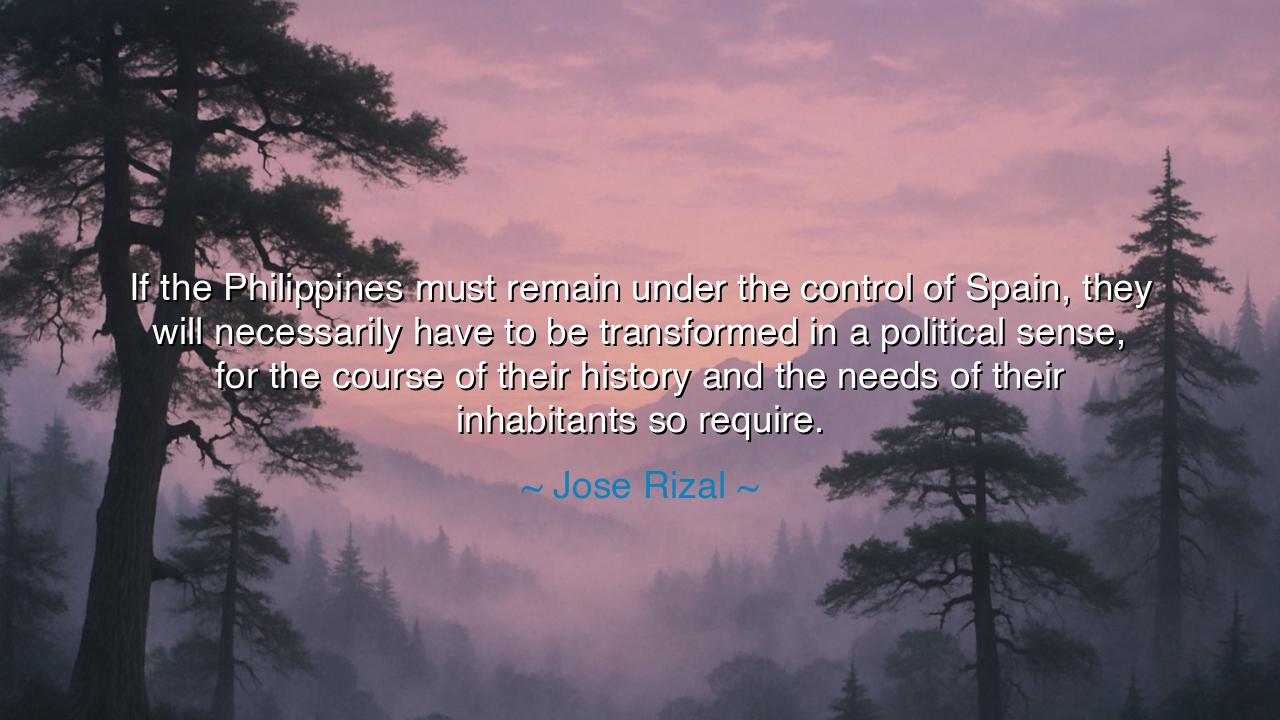
If the Philippines must remain under the control of Spain, they
If the Philippines must remain under the control of Spain, they will necessarily have to be transformed in a political sense, for the course of their history and the needs of their inhabitants so require.






In the twilight of empire and the dawn of awakening, the great Filipino patriot José Rizal wrote with prophetic clarity: “If the Philippines must remain under the control of Spain, they will necessarily have to be transformed in a political sense, for the course of their history and the needs of their inhabitants so require.” These words, drawn from the wisdom of both intellect and suffering, were not a cry of rebellion but a plea for justice, enlightenment, and evolution. In this statement, Rizal was speaking not merely as a reformer, but as a philosopher of nations—one who saw that no civilization could endure if it refused to grow in harmony with the needs of its people.
To understand the origin of this quote, one must journey to the late 19th century, when the Philippines lay beneath the weight of more than three centuries of Spanish colonial rule. The land was rich, the people devout, yet their voices were silenced beneath layers of oppression, censorship, and inequality. Rizal, educated in both Manila and Europe, saw with painful clarity that the Filipino spirit had awakened, that education and travel had stirred new thoughts of liberty and self-worth. He wrote these words as part of his treatise “The Philippines a Century Hence,” a work that sought to foretell the nation’s destiny. There, he reasoned that if Spain truly wished to maintain its dominion, it could only do so by transforming its rule—by granting Filipinos political representation, dignity, and the rights due to a mature people. In this, Rizal’s voice was both pragmatic and visionary. He understood that no empire can hold a people forever without justice, for the current of history always flows toward freedom.
Rizal’s wisdom lies in his recognition that change is not rebellion, but necessity. He did not call for the violent overthrow of Spain, but for transformation—an evolution of governance in step with the evolution of the Filipino soul. “The course of their history and the needs of their inhabitants,” he wrote, pointing to the unstoppable tide of progress, the awakening of a people educated, inspired, and connected to the wider world. He was warning Spain, not threatening it: that a nation cannot remain static while its people grow in wisdom and courage. Like the ancients who saw that water, when dammed too long, will one day burst forth, Rizal understood that if reform is denied, revolution becomes inevitable.
History would prove him right. Only two years after his martyrdom in 1896, the Philippine Revolution ignited—led by men who had read his works and taken to heart his belief that dignity could not be granted by decree, but must be claimed by will. Had Spain heeded Rizal’s words, perhaps blood would not have been shed, and the Philippines might have found liberty through reform rather than revolt. But the rulers were deaf to the wisdom of the scholar they executed. In killing Rizal, they only ensured that his words would live forever, carried in the hearts of his people like a sacred flame. Thus, his prophecy fulfilled itself: transformation came, but not through Spain’s grace—through the birth of a nation.
The ancients would have recognized in Rizal’s insight the eternal law of renewal and balance. Empires fall when they resist the rhythm of justice. Kingdoms perish when they silence the voice of conscience. Like the Roman Empire, which collapsed beneath the weight of its own corruption, or the dynasties of the East that fell when rulers turned deaf to their subjects’ suffering, Spain’s power in the Philippines was doomed the moment it chose pride over compassion. Rizal’s words were an invitation to wisdom—a call for Spain to save itself by saving the people it governed. But history, as ever, punishes arrogance and rewards truth.
Let the story of Rizal’s quote, then, be a mirror for all who hold power—in government, in business, in life. To lead is to listen; to rule is to serve. A nation, like a soul, grows restless when it is denied its natural growth. The wise ruler, like a good gardener, prunes not to weaken but to help the tree flourish. Rizal teaches that progress cannot be held back by chains, for the spirit of humanity will always rise toward light. Those who refuse to change will one day be changed by force. Those who deny the voice of the people will one day hear it in thunder.
So, my listener, take this teaching to heart: transformation is the law of life. Whether you lead a family, a company, or a country, attend to the needs of those who follow you. Ask what their hearts require, for in their welfare lies your own strength. Do not fear change, for it is the pulse of the living world. As José Rizal knew, to ignore the flow of history is to drown in it. To embrace it, to grow with it, is to endure. And thus, through understanding, compassion, and the courage to transform, one may yet build a legacy that stands not in domination, but in harmony—with truth, with justice, and with the timeless destiny of freedom.






AAdministratorAdministrator
Welcome, honored guests. Please leave a comment, we will respond soon